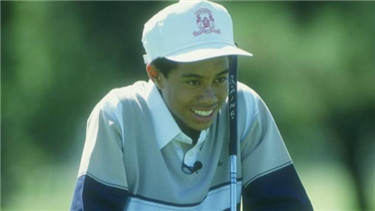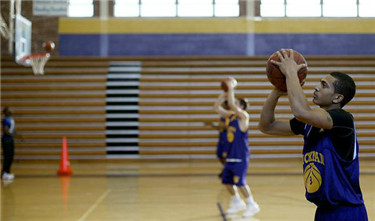5. Child Prodigies Don't Exist
5.“神童”其實(shí)不存在

In Geoffrey Colvin's book, Talent is Overrated, he claims that there really is no such thing as a child prodigy. His argument is that no one is born innately talented, but that everyone who is “great” practices and develops to that skill level.
杰弗里·科爾文(Geoffrey Colvin)在他的書(shū)中提到,天才是被高估的一類人,他宣稱世上并沒(méi)有真正的神童。他的論點(diǎn)如下:沒(méi)有人一出生就是天造之才,每個(gè)可稱為牛人的人都是通過(guò)不斷的實(shí)踐,一步一步提高,直至達(dá)到專業(yè)水準(zhǔn)。
When people claim that prodigies exist, they point to Mozart and Tiger Woods as examples. However, those two were actually seasoned pros by the time they were famous. Mozart's father was a music teacher who taught Mozart from the age of three, and then he trained with other professionals. By the time he was 14 and wrote his first opera, he had been studying music every day for nine years. He continued to study music until he was 17, and he then worked as a pianist after completing school. So by the time he was 25 and wrote his first masterpiece, he had been playing music daily for 22 years. As for the argument that he wrote music as a child, none of that music was done in his handwriting. His father was making a living off the fact that Mozart and his sister were prodigies, so there's a very good chance his father wrote the music himself.
人們?cè)跇O力證實(shí)天才的存在時(shí),往往都會(huì)以莫扎特和泰格·伍茲兩人為例。殊不知成名之前,他們?cè)诟髯缘念I(lǐng)域早已是行家里手。莫扎特的父親是一名音樂(lè)老師,在莫扎特三歲的時(shí)候他就開(kāi)始教授其音樂(lè)和一些其他知識(shí)。莫扎特14歲的時(shí)候?qū)懴铝俗约旱牡谝徊扛鑴。@也是他連續(xù)九年,每天不間斷學(xué)習(xí)音樂(lè)的結(jié)果。莫扎特的音樂(lè)學(xué)習(xí)一直持續(xù)到17歲,畢業(yè)之后他就做了一位鋼琴家。25歲那年,莫扎特創(chuàng)作出他的第一部代表作,而那時(shí)音樂(lè)成為他日常生活的一部分已有22年之久了。有些輿論謬稱莫扎特在孩童時(shí)期就開(kāi)始寫音樂(lè)了,(這簡(jiǎn)直是無(wú)稽之談),莫扎特的手稿中可沒(méi)有這些所謂的“早期音樂(lè)作品”。只不過(guò)他的父親曾打著莫扎特和他的姐妹是天才的幌子,為自己的音樂(lè)創(chuàng)作尋求一個(gè)絕佳的機(jī)會(huì)并借此謀生。
As for Tiger Woods, his father was a retired teacher and a golf fanatic that had an expert handicap. He started training Tiger at seven months old by giving him a putter and making him watch while he putted for hours and hours. As a child and into his teens Tiger was constantly training, often with professionals. By the time that Tiger was 19 and a member of the Walker Cup team, he had been practicing golf for 17 years. That isn't to say these two men weren't tremendously talented and masters in their own discipline. It's just that they trained for years and simply weren't born with innate talent.
至于老虎伍茲,他的父親是一名退休教師,同時(shí)也是一位高爾夫球迷,并且還是個(gè)中能手。伍茲的父親在伍茲7個(gè)月大的時(shí)候就讓他拿著推桿,在一旁看著自己一小時(shí)接著一小時(shí)地推球。也就是說(shuō),伍茲的整個(gè)少年時(shí)代都在不斷地接受職業(yè)化訓(xùn)練。雖然伍茲19歲就成為了沃克杯球隊(duì)的隊(duì)員,但那時(shí)他學(xué)習(xí)高爾夫已經(jīng)足足17年了。這并不是說(shuō)這兩個(gè)人沒(méi)有天賦,或是對(duì)他們自己的知識(shí)領(lǐng)域并不精通,而是說(shuō)他們所取得的成就,都是多年來(lái)的不斷訓(xùn)練的結(jié)果,并不是因?yàn)樗麄兲焐褪侨绱肆瞬黄稹?/p>
4. The 10,000 Hours Theory
4.天才也要花時(shí)間

A Professor at the University of Colorado named Anders Ericsson decided to look at what separates amateurs from professionals. In 1993, he released a paper that found on average amateurs only got about 4000 hours of practice, but professionals had practiced for at least 10,000 hours.
科羅拉多大學(xué)(University of Colorado)一位名叫安德斯·愛(ài)立信(Anders Ericsson)的教授決定研究“到底是什么把業(yè)余愛(ài)好者和專業(yè)人士區(qū)別開(kāi)來(lái)的”這個(gè)課題。1993年,他發(fā)表了一篇論文,文中指出,業(yè)余愛(ài)好者只花費(fèi)4000小時(shí)的練習(xí),專業(yè)人士至少要花上10000小時(shí),這就是10000小時(shí)理論。
Besides Tiger Woods and Mozart, another example of people who put in 10,000 hours were the Beatles. Before they were famous, they played full time for two and a half years in Hamburg, often for eight to 12 hours a day. It was at this time that they developed their signature sound. Then there's Bill Gates, who went to a preparatory high school that was one of the few in the country with a computer terminal. He spent more time on the computer than any other student, and was even allowed to miss math class to work on it. It was during that time and his years in university he earned his 10,000 hours.
除了老虎伍茲(Tiger Woods)和莫扎特,另一個(gè)投入10000小時(shí)以上時(shí)間練習(xí)的例子便是甲殼蟲(chóng)樂(lè)隊(duì)。成名前,他們?cè)跐h堡做了兩年半的全職演唱,經(jīng)常一天要唱8到12小時(shí)。也就是這段時(shí)期內(nèi),他們標(biāo)志性的聲線得到了發(fā)展。類似的例子還有比爾·蓋茨,非常幸運(yùn),他所在的預(yù)備高中是全美為數(shù)不多配置了計(jì)算機(jī)終端的幾所學(xué)校之一。而他在計(jì)算機(jī)上花的時(shí)間比其他學(xué)生多得多,學(xué)校甚至允許他翹掉數(shù)學(xué)課來(lái)研究計(jì)算機(jī)。這段時(shí)間加上大學(xué)的幾年,他進(jìn)行了不少于10000小時(shí)的練習(xí)。
While there's some debate over whether 10,000 hours is a rule or just a theory, many experts agree that a significant number of people who are considered “great” have, on average, 10,000 hours of experience.
雖然關(guān)于10000小時(shí)到底是個(gè)規(guī)律還是僅僅是個(gè)理論這一問(wèn)題還存在著爭(zhēng)議,但很多專家認(rèn)為,大部分公認(rèn)的牛人幾乎都有過(guò)10000小時(shí)的練習(xí)經(jīng)歷。
3. Deliberate Practice
3.練習(xí)才能得成功

If no one is born talented and you need 10,000 hours of practice, what's the most effective way of using those hours? One theory is something sociologists call “deliberate practice.” Essentially, there are six elements. The practice needs to be meant to specifically improve performance, and is even more effective if there's coaching. It needs to be repeatable, and feedback on a regular basis is crucial. It also has to be demanding, either physically or mentally. If you're doing all of this correctly, it shouldn't be a fun experience. An example would be a basketball player who isn't very good at free throws spending hours and hours just doing free throws while being coached. Not a great time no matter how big of a basketball fan you are.
如果并非生來(lái)就是天才,你就需要10000小時(shí)的練習(xí)(來(lái)取得進(jìn)步),那要怎么有效地利用這些時(shí)間呢?有一種理論,社會(huì)學(xué)家稱之為“有意識(shí)的練習(xí)”。從本質(zhì)上講,它有六個(gè)要素。實(shí)踐需要以提高能力為目的,如果有人指導(dǎo)的話,便會(huì)事半功倍。練習(xí)需要重復(fù)且有規(guī)律地進(jìn)行,而相關(guān)的反饋也很重要。不論是在精神上還是身體上,它最好都是有挑戰(zhàn)性的練習(xí)。如果你實(shí)踐到位,這也許不會(huì)是什么好玩的事情。一位不擅長(zhǎng)罰球的籃球運(yùn)動(dòng)員在教練的指導(dǎo)下一次又一次地練習(xí)罰球就是一個(gè)很好的例子。無(wú)論你是一個(gè)多么忠實(shí)的足球粉,這樣練習(xí)也不會(huì)覺(jué)得有趣吧?
Deliberate practice is important because practicing specific activities over and over again will get you more comfortable with that action. When you compete, you're simply using those repetitive tasks in a different environment. The practice needs to be difficult, because that's the only way someone can improve. If it's too easy, you never leave your comfort zone and never grow through challenge.
對(duì)某種具體活動(dòng)的反復(fù)練習(xí)會(huì)讓你在真正做它的時(shí)候更加得心應(yīng)手,這使得有意識(shí)的練習(xí)顯得尤為重要。當(dāng)你完成練習(xí)并開(kāi)始實(shí)際操作時(shí),你只是在非練習(xí)的環(huán)境中重復(fù)之前的練習(xí)任務(wù)。同時(shí),這樣的練習(xí),難度要求要略高,因?yàn)橹挥羞@樣,你才能有所提高。太過(guò)簡(jiǎn)單的練習(xí)只會(huì)讓人永遠(yuǎn)停留在自己的舒適區(qū)(譯注:完成某事毫不費(fèi)力的情況),永遠(yuǎn)不會(huì)在挑戰(zhàn)中成長(zhǎng)。
As for the feedback portion, Steve Kerr, the former chief learning officer of Goldman Sachs, said that practicing without feedback is like bowling with the pins behind a curtain. Without feedback, you won't get better and you won't care. So while it is possible to be amazing at something, you have 10,000 hours of hard work ahead of you.
關(guān)于反饋的重要性,史蒂夫·科爾(Steve Kerr),高盛集團(tuán)(Goldman Sachs,譯注:一家國(guó)際領(lǐng)先的投資銀行和證券公司)前任首席學(xué)習(xí)官表示,沒(méi)有反饋的練習(xí)就像是把保齡球投向幕布后的球瓶。如果沒(méi)有反饋,你不會(huì)變得更好,你也不會(huì)在意自己的表現(xiàn)到底如何。所以,如果你想要在某事上有所成就,首先你得完成這10,000小時(shí)的奮斗。
2. The Third Grade is The Most Important Year of Your Life
2.領(lǐng)先也需抓關(guān)鍵

Sociologist Robert K. Merton first coined the Matthew Effect in 1968. Simply put, it's the idea that the rich get richer and the poor get poorer. The reason this is such a big deal when it comes to success is that experts think the third grade is the most pivotal year of someone's life (no pressure, huh?). In the fourth grade, the learning model changes and it becomes incredibly important that children know how to read and learn independently. Children who don't have these skills began to avoid reading and start to fall behind. But to move on and do well in school you have to learn cumulatively, because school doesn't get easier as the years go on. If a student falls behind early, the gap would just widen over the following years. The kids that can read keep getting ahead, and the students who had problems keep falling behind. Studies have shown that if someone had problems reading in grade three they are four times more likely to drop out of high school.
1968年,社會(huì)學(xué)家羅伯特·金·默頓(Robert K. Merton)首次提出了“馬太效應(yīng)”(Matthew Effect)。簡(jiǎn)單來(lái)說(shuō),這一術(shù)語(yǔ)用以概括一種兩極分化的社會(huì)現(xiàn)象,即富人愈富,窮人愈窮。如何利用好這種效應(yīng)也是引導(dǎo)一個(gè)人走向成功的關(guān)鍵。專家認(rèn)為,三年級(jí)是一個(gè)人一生中最關(guān)鍵的一個(gè)學(xué)年(無(wú)壓力?呵呵)。進(jìn)入四年級(jí)后,隨著學(xué)習(xí)模式的改變,孩子們自主閱讀和學(xué)習(xí)的能力開(kāi)始變得極其重要。不具備這些技能的孩子開(kāi)始抗拒讀書(shū),成績(jī)也逐漸落于人后。為了在學(xué)校取得好成績(jī)并且不斷進(jìn)步,你必須不斷提高自己的學(xué)習(xí)能力——因?yàn)槟昙?jí)越高,學(xué)習(xí)難度越大。如果一個(gè)學(xué)生輸在了起跑線上,在接下來(lái)的讀書(shū)生涯中,他與領(lǐng)先者之間的差距會(huì)越來(lái)越大。能夠自主閱讀的孩子們持續(xù)領(lǐng)先,而這方面能力不足的孩子則會(huì)一直處于吊車尾的狀態(tài)。研究表明,三年級(jí)時(shí)不能掌握閱讀技能的學(xué)生,中學(xué)時(shí)期的退學(xué)率會(huì)比其他學(xué)生高出四倍。
1. You Have Amazing Potential
1.人人都是潛力股

On average, the human mind can remember a sequence of seven to nine numbers. After that it becomes incredibly hard to remember all the numbers in the right order. Researchers at Carnegie Mellon University wanted to know if someone of average intelligence could break that barrier with practice.
一般來(lái)說(shuō),人腦可以記住一組由七到九個(gè)數(shù)字組成的數(shù)列。但是此后要記得所有數(shù)字的正確順序就會(huì)變得異常艱難。卡內(nèi)基梅隆大學(xué)(Carnegie Mellon University)的研究者們想弄明白,擁有一般智力的人通過(guò)練習(xí)是否可以突破這個(gè)記憶力的極限,于是他們進(jìn)行了相關(guān)實(shí)驗(yàn)。
One test subject, who practiced two or three times a week for over two years, was able to remember 82 numbers before deciding to stop. Another subject hit 102 numbers when he stopped. It's not that they couldn't push further — the study just came to an end. Both of these test subjects did better with practice than people who said they had photographic memories.
兩年內(nèi)每周訓(xùn)練兩到三次的一位受試對(duì)象在停止記憶前記住了82個(gè)數(shù)字,另一位則記住了102個(gè)。如果不是受研究的時(shí)限性影響,他們可以記得更多。這兩位受試者通過(guò)練習(xí)擁有了比那些自詡記憶力優(yōu)良的人更強(qiáng)的記憶力。
Through these tests, researchers discovered what they called “the remarkable potential of ‘ordinary' adults and their amazing capacity for change with practice.” Their research showed that even “ordinary” people have the potential to be great by challenging themselves. If you work hard, your goals can be more attainable than you thought.
通過(guò)這些測(cè)試,研究者們得出了他們稱之為“普通人后天可激發(fā)出的非凡潛力及改變能力”的結(jié)論。他們的調(diào)查顯示,即使是普通人,只要勇于挑戰(zhàn)自我,也能爆發(fā)出驚人的潛力。只要肯腳踏實(shí)地,你所仰望的星空將不再遙不可及。
注:文章轉(zhuǎn)載自前十網(wǎng),譯者:寶貝花,郗莉紅,張萌,gina,圍巾











